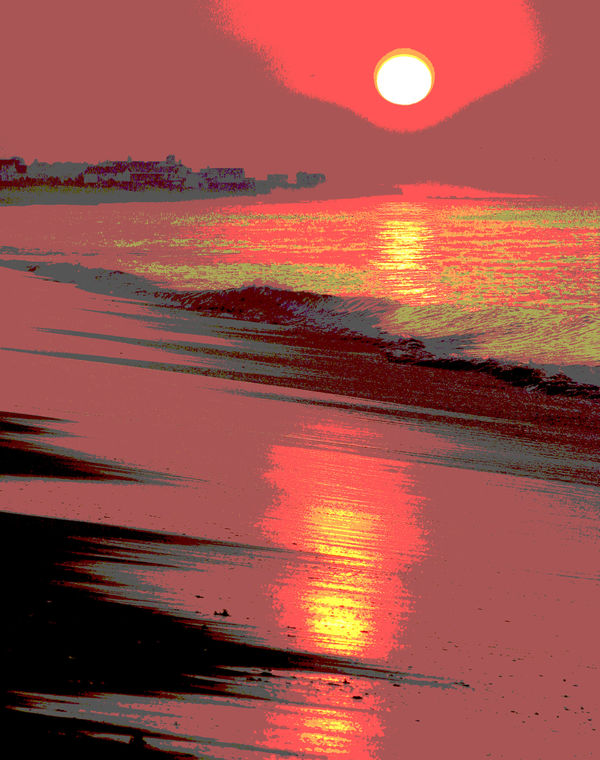What is Photography?
Jan 19, 2017 10:14:35 #
Festus wrote:
And everyone of the "true photographers" post processed! ....
And where did i suggest they didn't or that it was wrong in any way?
Jan 19, 2017 10:22:02 #
What is a "true representation"? What your eyes see? I'm color blind. My eyes don't even give me a "true representation"! 😀
Jan 19, 2017 10:32:32 #
machia
Loc: NJ
camerapapi wrote:
When Ansel Adams took a picture with his large for... (show quote)
I used to shoot exclusively chrome . And when I would enlarge a slide to a 8X10 or an 11X14 print , I could manipulate the light while photographing the slide onto the negative sheet and / or in the developer barrel . The only thing with chrome was that if you blew out the highlights from the beginning that was pretty much it . So I normally bracketed all my shots . Kodachrome 25 & 64 were my favorite . Glad to hear Kodak is bringing back Ecktachrome as I still shoot film now and then . I love digital , but there's something about chrome I love even more .
Jan 19, 2017 10:38:00 #
gvarner
Loc: Central Oregon Coast
It's the old argument - cameras don't take pictures, people do. Th camera is just a tool for the artist. Even the snap shooter is an artist if they're lucky.
Jan 19, 2017 10:40:51 #
Have y'all ever seen Michael Going's Altered Polaroid SX-70 photographs? Talk about post processing and editing! They are interesting and, in my opinion, art.
http://www.smithsonianmag.com/arts-culture/photographer-who-ansel-adams-called-anti-christ-180953525/[/quote]
http://www.smithsonianmag.com/arts-culture/photographer-who-ansel-adams-called-anti-christ-180953525/[/quote]
Jan 19, 2017 10:45:48 #
The Camera is just another artistic tool the same as a paint brush is, how it is used is up to the artist. If one wishes to paint a house or paint a subject on canvas, it is a decision that is made by the person holding the brush. Such is art.
Jan 19, 2017 10:46:16 #
I think this is a very interesting question. I take photographs to document my travels, but I also aspire to produce art. I often like to make photographs that capture something the eye doesn't usually see. Bokeh, for example. Or the opposite - a broad landscape with everything sharp - the eye can't take it all in at the same time but the camera can. Was Renoir a "bad" painter because he didn't capture a scene with the realism of a Hopper?
But, IMHO manipulation of an image can go too far and be gimmicky. Maybe it's okay if it doesn't look gimmicky. Or maybe it's okay even if it does look gimmicky. I really don't know. I think it was said that art is in the eye of the beholder. I kind of like this image, maybe even better than the original, because it's different. But it was too easy. Is it a photograph? Is it art? It certainly is different from what the eye usually sees.
I guess, in the end, it pleases you, that's all that matters unless you care if it pleases others, too.
But, IMHO manipulation of an image can go too far and be gimmicky. Maybe it's okay if it doesn't look gimmicky. Or maybe it's okay even if it does look gimmicky. I really don't know. I think it was said that art is in the eye of the beholder. I kind of like this image, maybe even better than the original, because it's different. But it was too easy. Is it a photograph? Is it art? It certainly is different from what the eye usually sees.
I guess, in the end, it pleases you, that's all that matters unless you care if it pleases others, too.

Jan 19, 2017 11:10:40 #
Here is an image I captured in Vancouver. One has a slight adjustment to definition when I processed it in iPhoto. The other is the same image I processed in Aurora HDR. I like the HDR version better. But, I think this illustrates what the discussion is about. Your critique is welcome. Thanks.


Jan 19, 2017 11:13:13 #
I like that image. Well done.
jack30000 wrote:
I think this is a very interesting question. I tak... (show quote)
Jan 19, 2017 11:28:24 #
ricardo7
Loc: Washington, DC - Santiago, Chile
mborn wrote:
I just read the article and I agree the last parag... (show quote)
No. Not true. A picture of someone's cat or stupid kid would fit this definition.
Jan 19, 2017 11:34:36 #
mborn wrote:
I just read the article and I agree the last parag... (show quote)
So, how would dead pan photography such as Ed Ruscha's or Bernd and Hilda Becher's work fit into this argument that fine art photography must go beyond the literal interpretation of the scene.
http://www.tate.org.uk/about/projects/transforming-artist-books/summaries/edward-ruscha-twentysix-gasoline-stations-1963
https://www.guggenheim.org/artwork/500
Jan 19, 2017 11:36:52 #
TheDman
Loc: USA
tdekany wrote:
Although I don't care one bit how anyone shoots. All I am interested in is the end product. Although I wonder if people realize how much and how well all the pictures we see around taken by pro photographers are manipulated.
Can I double bold that? Triple bold, maybe? That's all that matters. I don't know why people get riled up by what 'mentality' anyone had whole they were shooting. Who cares? All that matters is that they produce a good image.
I couldn't care less how they do it. I don't care if they work their ass off to 'get it right in camera' (good luck with that) or if they shoot blindfolded and pp whatever their camera happened to be pointing at. If the image is good, it's good. Period. Doesn't matter how they got there.
Jan 19, 2017 11:43:11 #
When I first joined UHH I was amazed at the number of fantastic photos people submitted for perusal by other members. But I was also amazed at the absolutely horrible photos submitted. Not only that was the amount of people who looked at the horrible photos and then posted the usual, great capture Fred, that is a wall hanger Myrtle, you should submit that to a contest Mary Sue. Then I remembered when I was a photo manager of a chain drug store. Two elderly ladies came in at least once a week to have photos developed. They used a Kodak 110 camera for all of their photos. I never looked at their photos but one day saw them happily turning in a roll of film. I couldn't help but ask what they were so excited about. Their cat had just had kittens and they used up the entire roll of film taking photos of the cat and kittens. The day the film came back from the lab they were right there to see their photos. After they looked at them for a minute or two they were both oohing and ahhing over the results. They insisted I look at their babies. What they saw was a black cat with some beautiful kittens on their kitchen floor, laying on a blanket. What I saw was one big black dot with 6 smaller black dots close by. Of course the 110 camera had not picked up any detail at all because they stood o one side of the kitchen taking a photo of the cats on the other side of the kitchen. What could I say but compliment them on their photography and their good luck getting such fine shots. My point with this long tail is each of us sees what they want to see in a photograph we have taken. How many times have we seen photos submitted that are out of focus, poor composition etc.? Yet other members say the photos are first rate. I no longer say anything at all unless it is truly an acceptable photo. Once I (without being asked) commented on composition on a submitted photo. I was jumped on six ways from Sunday by all comers as I didn't have a right to comment without being asked. So yes, all photos are wonderful to the photographer.
Dennis
Dennis
Jan 19, 2017 12:10:10 #
Working with a camera for me: is both useful and expressive.
Consider offering an antique table for sale : Post processing on a 'lost leg' onto the image would be misrepresentation. As would be creating a multicoloured eagle and stating that it was a newly discovered species. For much of the time there is a place for capturing 'What is'.
To consider this as journalism is wrong. The story one reads is always biased, the images that accompany a story may not be what is 'ordinary' but of a time and place, from that situation, that is extraordinary in order to make a new truth of the situation. Consider images of firemen: they are usually taken at the height of the smoke and flame in a crowded city centre in order to be dramatic yet firemen respond to more small fires of burning rubbish or chip pan fires than large commercial buildings.
Holiday pictures do not represent your day to day life. Chances are most people will never experience seeing fog from the top of a mountain. Yet we still take images of this 'reality' as is.
The use of a camera can also be expressive: The unusual happen-stance when light and form appear different to what we generally experience. The ability for a camera to record at wider parameters than our eyes. To 'see' in sharp clarity or subdue bright light in order to discern the content of shadows. The ability to alter what we see without outside influences but by personal choice.
Both of these uses are recordings of 'what is' IF (you were there, could see long distances, can see in the dark, you bent down and looked closely etc)
Images, as Art: uses the camera as a prop. A means to an end. To manufacture what you would like to see. A camera does not have feelings or emotions but as a tool can record everything that you decide should be there as a starting /finishing point in the creation of your art.
The Art of Photography is achieving all of these: using whatever means and skills you have available.
Photoshop is not an automated process it is a choice in part or whole. Buying long lenses is a choice, Macro Photography is a choice, Climbing mountains at dawn is a choice.
Like marriage - for better or for worse, depends entirely upon the choices made by the individuals.
To try imposing 'rules' or limits to what people buy, do or use their camera for is merely an opinion. Buying a camera is not signing the rest of your life into a faith, concept, or religion.
There are no rules or limits in Photography.
Consider offering an antique table for sale : Post processing on a 'lost leg' onto the image would be misrepresentation. As would be creating a multicoloured eagle and stating that it was a newly discovered species. For much of the time there is a place for capturing 'What is'.
To consider this as journalism is wrong. The story one reads is always biased, the images that accompany a story may not be what is 'ordinary' but of a time and place, from that situation, that is extraordinary in order to make a new truth of the situation. Consider images of firemen: they are usually taken at the height of the smoke and flame in a crowded city centre in order to be dramatic yet firemen respond to more small fires of burning rubbish or chip pan fires than large commercial buildings.
Holiday pictures do not represent your day to day life. Chances are most people will never experience seeing fog from the top of a mountain. Yet we still take images of this 'reality' as is.
The use of a camera can also be expressive: The unusual happen-stance when light and form appear different to what we generally experience. The ability for a camera to record at wider parameters than our eyes. To 'see' in sharp clarity or subdue bright light in order to discern the content of shadows. The ability to alter what we see without outside influences but by personal choice.
Both of these uses are recordings of 'what is' IF (you were there, could see long distances, can see in the dark, you bent down and looked closely etc)
Images, as Art: uses the camera as a prop. A means to an end. To manufacture what you would like to see. A camera does not have feelings or emotions but as a tool can record everything that you decide should be there as a starting /finishing point in the creation of your art.
The Art of Photography is achieving all of these: using whatever means and skills you have available.
Photoshop is not an automated process it is a choice in part or whole. Buying long lenses is a choice, Macro Photography is a choice, Climbing mountains at dawn is a choice.
Like marriage - for better or for worse, depends entirely upon the choices made by the individuals.
To try imposing 'rules' or limits to what people buy, do or use their camera for is merely an opinion. Buying a camera is not signing the rest of your life into a faith, concept, or religion.
There are no rules or limits in Photography.
Jan 19, 2017 12:19:59 #
rvhowdy wrote:
Here is an image I captured in Vancouver. One has a slight adjustment to definition when I processed it in iPhoto. The other is the same image I processed in Aurora HDR. I like the HDR version better. But, I think this illustrates what the discussion is about. Your critique is welcome. Thanks.
While one or the other may not fit someone's aesthetic ideals, values or taste, this does not negate the fact that both are photographs.. There is a massive difference between the question is an image good or bad and whether it is photography or not. As I state earlier no amount of processing can strip a photographic image or its inherent quality of being a photographic image.
If you want to reply, then register here. Registration is free and your account is created instantly, so you can post right away.





